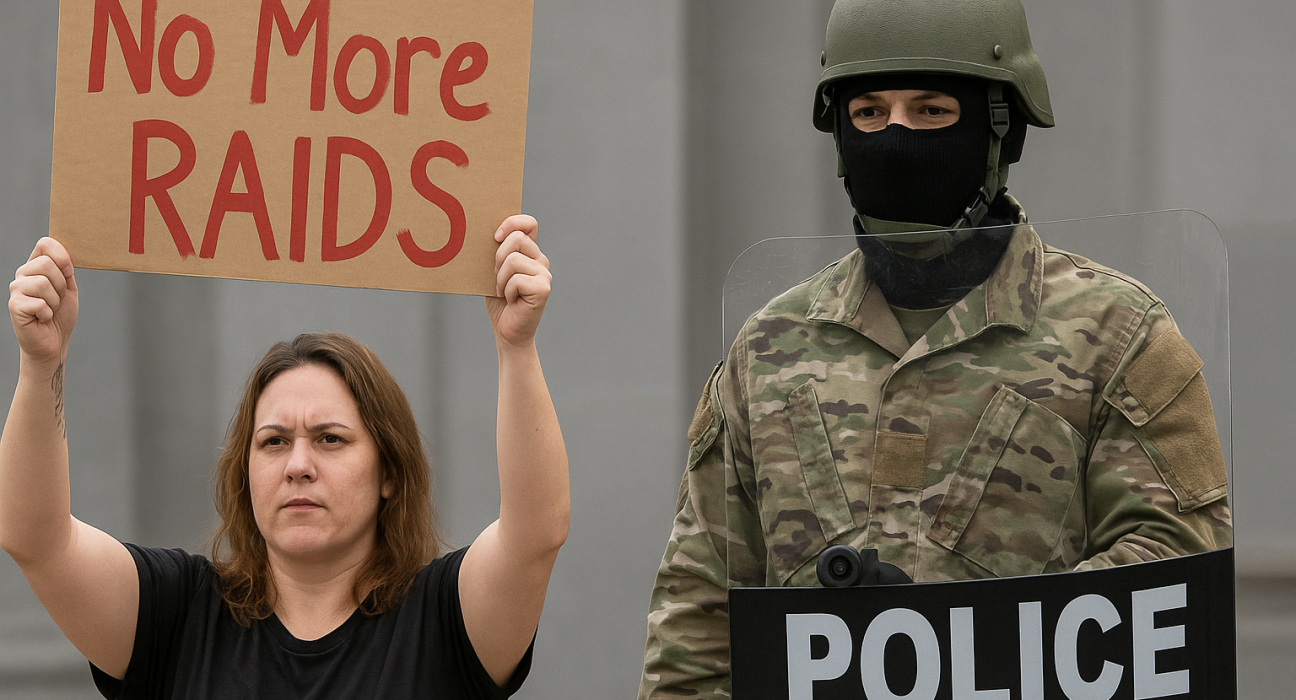On July 11, 2025, CBS News Los Angeles reported that U.S. District Judge Maame Ewusi‑Mensah Frimpong, an appointee of President Biden, temporarily halted Immigration and Customs Enforcement (ICE) raids in Los Angeles and nearby counties. The ruling follows a lawsuit filed by the American Civil Liberties Union (ACLU) and several immigrant rights groups, alleging that ICE engaged in unconstitutional tactics, including racial profiling and warrantless arrests CBS News+9CBS News+9CBS News+9.
The lawsuit claims that ICE agents conducted “roving patrols” at bus stops, day labor areas, car washes, Home Depot parking lots, and agricultural sites. According to plaintiffs, ICE officers detained Latino-looking individuals, Spanish speakers, or those perceived to be day laborers—often without reasonable suspicion or warrants. These actions, plaintiffs argue, violated the Fourth Amendment’s protection against unreasonable searches and seizures, as well as the Fifth Amendment’s due process guarantees ABC7 Los Angeles+7CBS News+7The Wall Street Journal+7.
Judge Frimpong issued two temporary restraining orders:
- Stops allowed only with reasonable suspicion—ICE agents are barred from detaining individuals solely on the basis of race, ethnicity, language (e.g., speaking Spanish or having an accent), occupation, or location, unless there is reasonable suspicion they violated immigration law The Washington Post+7CBS News+7The Wall Street Journal+7.
- Guaranteed access to legal counsel—Detainees must be able to receive legal counsel seven days a week while detained at the downtown Los Angeles immigration facility Yahoo+10CBS News+10The Wall Street Journal+10.
ACLU attorney Mohammad Tajsar emphasized during proceedings that “no matter the color of their skin, what language they speak…” constitutional rights apply to all NBC Los Angeles+4CBS News+4CBS News+4.
The Trump administration’s legal team argued that ICE agents based their actions on a “totality of the circumstances” and had not unlawfully detained individuals. U.S. Attorney Bill Essayli stated that ICE would continue to “enforce the law and abide by the U.S. Constitution” CBS News+3CBS News+3NBC Los Angeles+3.
California state officials praised the ruling. Governor Gavin Newsom described it as a victory for justice and a necessary constraint on federal profiling practices. Los Angeles Mayor Karen Bass—along with other officials from municipalities like Culver City, Monterey Park, Pasadena, Santa Monica, Montebello, Pico Rivera, West Hollywood, and LA County—joined the lawsuit, invoking constitutional protections, including the Tenth Amendment and due process assurances The Wall Street Journal+5CBS News+5CBS News+5.
The lawsuit notes rising economic costs tied to the raids. Since early June, ICE and Customs and Border Protection (CBP) have detained 2,792 individuals in the LA area, resulting in approximately $9 million in extra costs, including lost tax revenue and overtime for local agencies CBS News+3CBS News+3CBS News+3.
Community response included protests—such as blocking the Sixth Street Bridge—and a 15-mile “Run Against ICE” solidarity event. The judge is expected to rule on further hearings soon, making the restraining orders potentially long-lasting CBS News.
Main Points
- A federal judge halted ICE raids in Los Angeles under ACLU litigation on Fourth and Fifth Amendment grounds.
- Restraining orders limit ICE arrests based on race, language, location, or occupation without reasonable suspicion.
- Detainees must have consistent access to legal counsel during detention.
- Immigrant rights advocates and local governments joined in support; federal officials contested profiling claims.
- The legal battle reveals broader concerns over constitutional rights enforcement and local financial burdens associated with raids.
Implications & Outlook
- Short-Term Impact: ICE operations will be constrained in Los Angeles and nearby counties pending a final ruling.
- Potential Precedent: This decision may inform similar legal challenges elsewhere, shaping future ICE enforcement protocols.
- Community and Political Response: With strong backing from state leaders and local jurisdictions, the case may prompt revisions to federal enforcement tactics.
- Legal Process Ahead: As further hearings unfold, the court will evaluate the evidence and determine whether the restraining orders become permanent.
- Broader Usage: The case highlights tension between federal immigration enforcement and constitutional protections at local and state levels.
